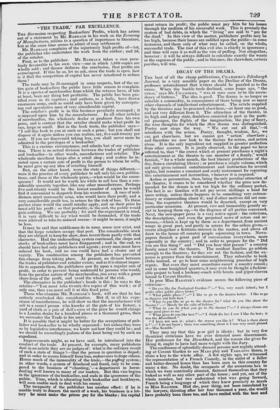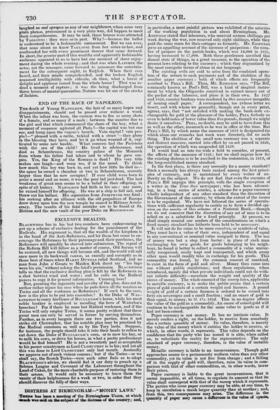DECAY OF THE DRAMA.
THE best of all the cheap publications, CHAMBERS'S Edinburgh Journal, in a very sensible paper on the Decline of the Dranta, professes astonishment that writers should be puzzled as to the cause. When the buckle trade declined, some ?ears ago, " the cause," says Mr. CHAMBERS, " was at once seen to[be the ascen- dency of buttons." The idea is good. The drama is no longer so saleable a commodity, in consequence of there being now so many other channels of intellectual entertainment. The article Supplied by the theatres may be procured elsewhere,—at least one as good, and not very different from it. The attraction of the theatre, in its high and palmy state, doubtless consisted in part in the poeti- cal passages, the flights of the imagination, the play of fancy, the wise thoughts for which the then drama was distinguished. Poetry now stops the way. " We cut out all that,"—it interferes with the action. Poetry, thought, wisdom, &c"., we can get elsewhere, but we cannot get " action" elsewhere ; and therefore we now look to the theatre for action, and action alone. It is the only ingredient not supplied in greater perfection from other sources. It is justly observed, in the paper we have referred to, that ".the crown which at present purchases a night's entertainment at the theatre to one member of a family," would furnish, "for a whole month, the best literary productions of the day, from a circulating library ; or purchase a single volume, which not only gives rational entertainment and instruction for several nights, but remains a constant and ready instrument for repeating this entertainment and instruction, whenever it is required."
Action or personation, then, being the only peculiar attraction of the theatre, it comes to be considered whether the price now de- manded for the drama is not too high for the ordinary pocket. The fact is so: families will not pay seven shillings a head for mere acting, unless there happens to be something very extraor- dinary or commanding about it; and if other motives did not com- bine, the expensive theatres would be deserted, except on very particular occasions. . At present, vice and immorality greatly as- sist in keeping them up,—to the disgrace of all parties concerned. Next, the newspaper press is a very active agent : the criticisms, the descriptions, and even the perpetual news of actors and ac- tresses,—which is kept up by them as a department, from ancient usage in great part, and partly in return for the orders given,— create altogether a fictitious interest in the matter, and above all draw to the house all country people sojourning in town. News- papers furnish a great part of conversation everywhere, more especially in the country; and in order to prepare for the "Did you see this thing?" and " Did you hear that person?" a country family must visit the theatre. The resident families go seldom enough to the theatres ; for they are not the fashion, and the ex- pense is greater than the entertainment. They subscribe to book clubs instead, or go to hear some neighbouring preacher of high repute. But even they must sometimes escort a country cousin; and in some benighted quarters, it may even be thought a fashion- able project to load a hackney-coach with berets and gigot-sleeves bound to Covent Garden.
In poor Miss BAGSTER'S evidence occurs the following piece of criticism-
" Do you like the Zoological Gardens ?"—" Yes, very much indeed; but I prefer other public places better." " What public places ?"—" I like to go to the theatre better. I like to go to theatres and balls best."
" What do you like to go to the theatre for? what do you like about the theatre?"—" Merely for the sake of fashion." " What do you do when you go to the theatre ?"—" I always choose out some good piece to see." " What piece do you like best?"—" I think the last I saw I like the best; it was the Hunchback."
" I have not seen it : what's the reason you like it ? What is there about it ?"—" I do not know-; there was something about it I was very much pleased at—Miss Kemble."
They may say that this pcor girl is idiotic; but in very few theatrical criticisms have we ever detected more discernment. Her preference for the Hunchback, and the reason she gives for liking it, ought to have had more weight with the Jury. The confluence of splendidly-dressed persons now nightly attend- ing at Covent Garden to see MARS play and TAGL1ONI dance, is alone a key to the whole affair. A few nights ago, we witnessed. the representation of a French Comedy, in the midst of a fuller and better-dressed house than has been seen in this country for many a day. No doubt, the occupants of the numerous ,bex in which we were centrically situated, flattered themselves that they looked as well as any other part of the house ; and yet, out of the whole number, but two understood what was going forward, French being a language of which they knew precisely as much as Miss BAGSTER. Had she, poor thing, not been immolated by the lawyers; thirsting after her four thousand a year, She would have probably been there too, and have smiled, with the best and laughed as mai apropos as any of our neighbours, when some very plain phrase, pronounced in a very plain way, did happen to meet their comprehension. It may be said, these houses were attracted by TAGLIONI : they were so in part. Why?—because the ballet is understood to be a fashionable amusement. But we can aver, that none about us knew TAGLIONI from her sister-in-law, and confounded her with every prominent dancer that came forward. In short, the greater part of this wealthy and apparently fashionable audience appeared to us to have but one moment of sheer enjoy- ment during the whole evening ; and that was when LAPORTE the actor, not the manager, came forward to announce the entertain- ment for the subsequent night, in English. When their ears heard, and their minds comprehended, and the broken English seasoned intelligibility with ridicule, oh then, what a buest of delight and applause issued from the whole house ! That was in- deed a moment of rapture ; it was the being discharged from three hours of mental quarantine. Nature was let out of the stocks of fashion.




























 Previous page
Previous page